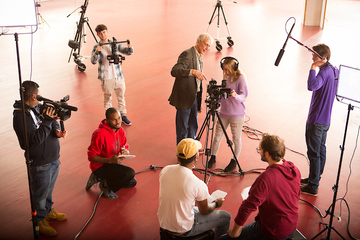Two Departments Rank Among Nation’s “Best Values”

03/12/2019
A pair of SUNY Cortland academic programs have been recognized as two of the highest-value educational offerings of their kind in the United States, according to a new analysis.
CollegeFactual.com recently recognized the College’s Communication and Media Studies Department and its History Department as among the “Best Value for the Money” in the nation, demonstrating SUNY Cortland’s long commitment to providing students a high-quality education at an affordable cost.
Communication and Media Studies ranked No. 20 among its peers from colleges and universities in the U.S. History, meanwhile, was ranked as the 10th-best value in New York state and placed among the top 10 percent of all history programs in the country.
The study considered factors including yearly cost, the average time taken by students to graduate and the quality each college provides to its students in those respective fields. SUNY Cortland’s low tuition, low student loan default rate and above-average mid-career earnings for graduates helped these two departments rank highly.
Quality of instruction in both departments is one major reason why both are sought after by students.
“We have award-winning teaching and research faculty who pride themselves on being available to students and who excel at ensuring that students leave their classes with the knowledge and skills they need to succeed,” said Paul van der Veur, chair of the Communication and Media Studies Department.
Communication and Media Studies is one of the College’s most popular majors. It offers coursework ranging from broad-based human communication and popular culture to specialized programming in journalism, public relations, advertising, media production and cinema studies. Students have access to a robust equipment checkout system and state-of-the-art tools to produce content for everything from social media to film and video.
All students in the department participate in student media clubs and internship programs, including radio, television, newspaper and film. These allow students to meet others with similar interests and provide them with opportunities for leadership and job-related knowledge and skills.
“These experiences prepare them for an extensive internship program, which in turn helps prepare them for entry into the workforce,” van der Veur said.
SUNY Cortland’s History Department places an emphasis on the student experience, helping prepare them for the variety of careers they may pursue. A three-credit experiential learning requirement allows students to complete an internship, do hands-on research with a faculty member or take part in a project-based course. Each fall, history majors have the option of taking one-credit of their experiential learning with department members at the College’s William H. Parks Family Center for Environmental and Outdoor Education at Raquette Lake.
Those experiences help students develop critical thinking and writing skills that will advance them in a future career in teaching, academics or practically any other field.
“We have an incredible faculty, people who are teacher-scholars to a person, and so we’re thinking all the time about how to bring the latest scholarship to our students,” said Randi Storch, chair of the History Department.
“We’re also really engaged in the new field of scholarship of teaching and learning in history. There is a real focus not just on how to teach, but on how students learn in history and thinking about history as a way of being in the world. We’re not assuming that students come to us knowing how to do the work of historians, but we’re thinking about what those historical thinking skills are and breaking them down and helping students to develop over time with us.”
Another recent requirement in the History Department is an Introduction to Public History course that allows students to think about the ways history lives in the world outside of a traditional classroom.
“Our History Department is incredibly innovative and creative and our curriculum is absolutely cutting-edge,” Storch said. “I think we’re doing some of the most innovative teaching that’s happening in the nation.”

